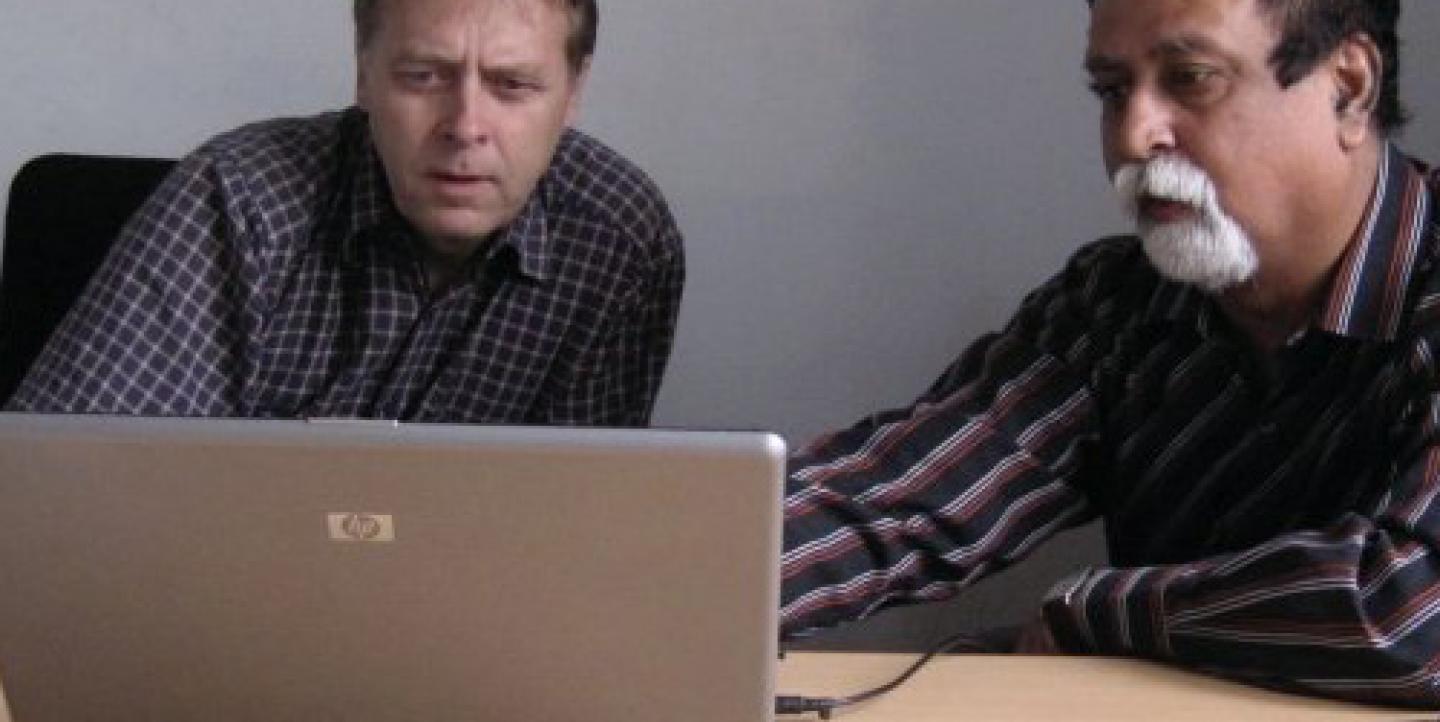The International Media Institute of India (IMII) will open July 5 in New Delhi, offering cutting-edge training in print, audio, video, Web and mobile news production. At the end of the program, students will receive a Post-Graduate Diploma in Journalism and will be fully qualified to work as reporters or copy editors in traditional or new media platforms.
IMII is a joint project of the Washington, D.C.-based International Center for Journalists and the Society of Policy Studies, a Delhi think tank. Recently, IJNet interviewed two ICFJ Knight International Journalism Fellows who are involved in the establishment of IMII, Jody McPhillips and Dave Bloss. (Pictured: ICFJ’s Dave Bloss on the left and Sunil Saxena, IMII’s dean, on the right. They are at IMII’s office in Noida, on the outskirts of Delhi.)
IJNet: How did IMII come about and how long has the process taken?
IMII: IMII came about through a discussion between Knight Foundation president Alberto Ibarguen and Tarun Basu, who heads the Indo-Asian News Service based in Delhi. Basu said Delhi needed a top-flight post-graduate journalism program, and the Knight Foundation ultimately decided to support the school. After 18 months of preparation, the school is now scheduled to open on July 5.
IJNet: Why is this program important?
IMII: With journalism education evolving so rapidly throughout the world, it’s imperative to provide all students with hands-on training in print, photo, video, audio, online and mobile phone journalism, and to help them understand that their jobs will continue to change rapidly throughout their careers.
IJNet: What facilities and equipment will the school require?
IMII: We occupy two floors of a building in Noida, located on a Metro line just across the Yamuna River from Delhi. It’s located near most of the major electronic media companies in Delhi. Most of our equipment is portable -- laptops and Flipcams so students can get out of the classroom on reporting assignments quickly.
IJNet: How many students can you accept to the program?
IMII: We are planning to offer admittance to 30 students for the 11-month post-graduate course that begins on July 5.
IJNet: Is there any financial aid available?
IMII: The first-year tuition has been priced at only 50,000 rupees (about US$1,100) to encourage students to join the new course. Thanks to some generous individual donors, IMII will be able to offer reduced tuition to a few talented students who qualify.

IJNet: What kind of previous education is required to enter the program?
IMII: Completion of an undergraduate degree in any subject before July 5.
IJNet: Who are the faculty members you’ve determined?
IMII: Dean Sunil Saxena is a veteran Indian journalist and media trainer. Knight Fellows Dave Bloss and Jody McPhillips have taught a variety of courses throughout Asia for the past 10 years. Poh Si Teng and Adam Jadhav are freelance multi-media journalists in Delhi who will help students with new technology. Veteran Indian journalists will be recruited to teach specialty courses, and some international trainers will be called on as needed.
IJNet: What kind of technology will you have available to the students?
IMII: Each student will have a school laptop and access to recording equipment and video Flipcams. A Macintosh computer room will be used for video editing and production. Other facilities include a library, interview rooms and a canteen for low-cost meals.
IJNet: Where will some of the students intern and how did you arrange those positions?
IMII: We're in the process of arranging these internships. Major Delhi media outlets are very generous in inviting student interns to join them. Our students will have skills other students lack, which should make them very attractive to media outlets.
IJNet: How do you think this program will help students get a job?
IMII: As elsewhere in the world, the student who can walk into a newsroom and work in video, audio, print, online or mobile journalism from Day One on the job is going to be attractive to any boss who is looking to work on all these platforms while hiring as few people as possible.
IJNet: Lastly, do you have any tips for students interested in applying?
IMII: Convince us that journalism isn't just a job, but a passion for you as you plan your work future. We give all candidates a written exercise so we can try to understand their thinking process, but we depend heavily on the interviews. We're looking for candidates who really want to be journalists and understand that the learning process that starts at IMII will continue throughout their careers.
For more information or to apply, visit www.imii.co.in. To join IMII's Facebook group, click here.

